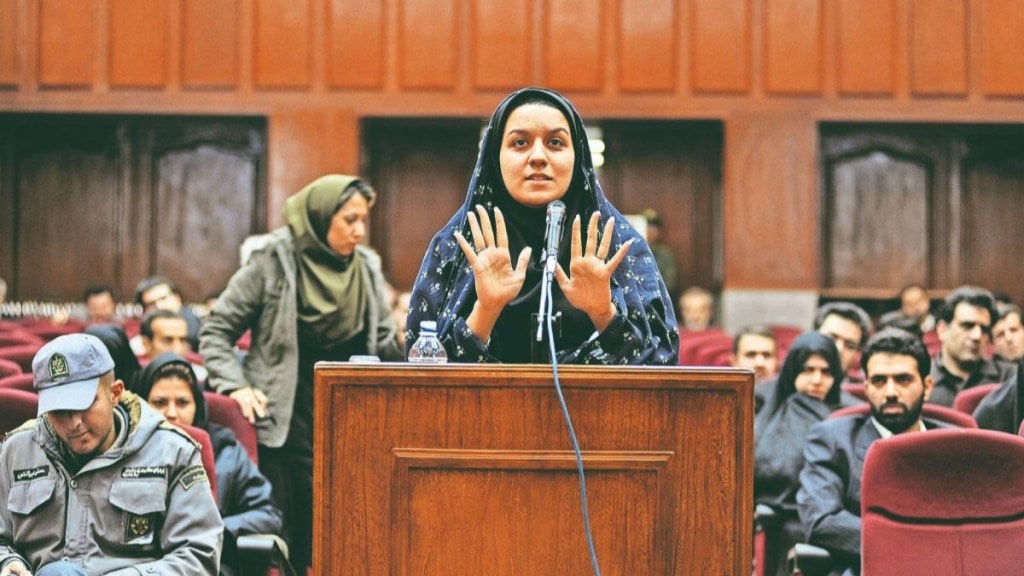On a spring day in 2007, Reyhaneh Jabbari was in an ice cream shop beaming on the phone about designing a booth for an international trade fair in Tehran. The 19-year-old computer science student and part-time interior designer soon found her approached by a middle aged man, who confessed to eavesdropping on her call. “I am a plastic surgeon and want to convert my place into a clinic,” he said, seeking the girl’s help for designing it. “I was bursting with excitement,” she would later recall the day’s events—designing a trade fair booth and another work offer—that was expected to change her life forever.
Invited to visit an apartment she was supposed to design for the clinic of the so-called plastic surgeon, Reyhaneh suddenly found herself cornered against her will. The man, Morteza Sarbandi, was a former secret service agent. Reyhaneh grabbed a knife from the apartment’s kitchen and tried to resist Sarband’s attempt to rape her. In the end, she stabbed him in self-defence, leading to his death. Within hours, the police were at Reyhaneh’s home to charge her with murder of Sarbandi. Seven years later, the young woman would stand on the execution platform with a hangman’s noose around her neck.
The story of Reyhaneh’s life and death in a prison in Tehran, is the subject of German artist and filmmaker Steffi Niederzoll’s debut documentary, Seven Winters in Tehran, part of a package of movies from Germany, the country in focus at the Habitat International Film Festival (March 8-17) in the national capital. The German films at the festival include this year’s Oscar nominees for Best Foreign Language Film, celebrated director Winders’ Perfect Days and Ilker Catak’s The Teacher’s Lounge along with a series of virtual reality works.
Filmed secretly in Iran, Niederzoll’s Seven Winters in Tehran, also part of the International Film Festival of Kerala in December, the Bangalore film festival in March and the upcoming inaugural edition of Cinevesture International Film Festival in Chandigarh, witnessed screenings in India and Germany to coincide with this year’s International Women’s Day on March 8. Based on videos and voice clandestinely recorded and smuggled out of Iran, the film is a powerful indictment of gender injustice, abuse of power and a still prevailing toxic patriarchal system. Art works and interviews appear in the documentary to portray the tragedy in the arrest and execution of Reyhaneh while affirming hope and justice in the fight by millions of women across the world.
Seven Winters in Tehran, which was the opening film at the Berlin festival’s Panorama programme last year, opens with images from inside the prison in Tehran where Reyhaneh was kept. An artist and filmmaker by training, the Nuremberg-born Niederzoll recreated the prison cell by artistically building the bunk beds, a disturbing image that sinks deep into minds of the viewer exposing the absurdity and brutality of a flawed justice received by a young woman who dreamed to follow her ambitions in a modern world. “It was a very long journey to search for all this material,” Niederzoll tells FE about gathering videos and voice secretly from Iran. “On the one hand over the years the family collected a lot by themselves, newspaper reports and police investigation documents. Iran has a corrupt system and if you pay you can get, maybe not a lot, but at least some documents, the copies of investigation reports from the police,” she adds.
The 97-minute film shows wide shots of Tehran, something other foreign filmmakers normally shoot in identical locations outside Iran. “The Filmmakers Collective of Iran gave me access to their archive, shots of Tehran they had filmed for different purposes,” says Niederzoll, who studied direction at Cuba’s International School of Cinema and Television, conceptualised by Colombian writer Gabriel García Márquez with the support of then Cuban president Fidel Castro. Among the works of Márquez is Clandestine in Chile, based on a secret documentary made by Miguel Littin under the nose of dictator Augusto Pinoche. Filmmaking activists in Iran shot the apartment where the sexual assault on Reyhaneh happened. “They took a great risk to do this job because it was quite dangerous,” says the filmmaker, whose previous works include short films Petuhtantes, which premiered at the Beirut International Documentary Festival in 2004, and Lea, which premiered at the Berlin festival in 2008.
“I had a thousand pages of the diary of Reyhaneh and I don’t know how many pages of letters (she sent home). She wrote a lot,” says Niederzoll. “The writings were my access to her because I never met her. I got in touch with her family two years after her execution. I got some recordings of what she was reading from parts of these letters to her mother smuggled out of the prison. She speaks on the phone and says, ‘Mother, record’, and the mother records,” says Niederzoll, explaining the origin of the idea of empty prison rooms shown in the documentary. “I wanted to give Reyhaneh her own visual narration. I had this early idea of empty rooms and locations we don’t have access to. But these locations in the prison were important to Reyhaneh.”
It took Niederzoll five years to make the movie after first reading news of Reyhaneh’s execution in 2014 in a German newspaper. Arrested in 2007 for the murder of Sarbandi, Reyhaneh was portrayed by Tehran newspapers as a serial killer, not a victim of a vicious sexual assault. Even before the trial began, a court ordered 30 lashes for an affair with Sarbandi that she never had. Two years later, she was sentenced to death by a court which cast aspersions on her character.
On October 25, 2014, Reyhaneh was hanged in a prison in Tehran. Reyhaneh’s mother and two younger sisters who escaped to Germany feature in interviews in the movie, which is narrated in the name of Reyhaneh by famous Iranian actor Zar Amir Ebrahimi, who won the Best Actress prize in Cannes in 2022 for her role as a journalist investigating a serial killer of sex workers in the Iranian city of Mashhad in Holy Spider, an Oscar nominee for Best Foreign Language Film last year.








